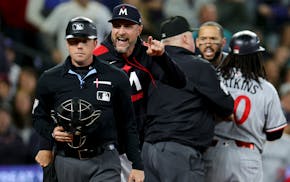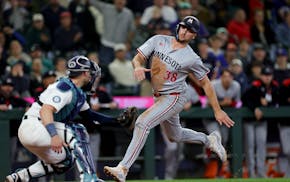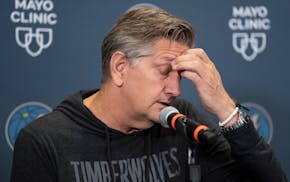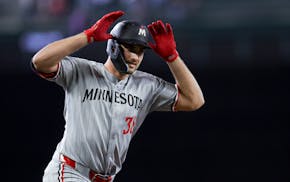He didn't admit it then, and he certainly wouldn't admit it now, but there must have come a time this summer when Minnesota United coach Eric Ramsay wondered, at least briefly, whether he'd made a big mistake.
At one point, his team had lost six straight games, a new club record. His starting goalkeeper and top striker had been commandeered by Canada for Copa América, something that his new league didn't seem to have considered as a possibility when making the schedule. His best player had disappeared, months before, and then was unceremoniously sold.
It's one thing for a young British manager to take his first head coaching job in MLS, a league that's not entirely well-respected in the hallowed halls of English football; it's quite another to have it go poorly.
That the Loons recovered from their midseason disaster is a testament to the club as a whole — but also to Ramsay. In his first season as manager, the 33-year-old guided Minnesota to a top-10 finish in the overall standings, and he now has the Loons into the conference semifinals, where they have a chance to upset the LA Galaxy on Sunday evening.
The Welshman rose quickly in the coaching ranks in England. Even as young coaches become less and less notable in the sports world, at age 29 he'd still done well to become an assistant coach with Manchester United's first team.
The traditional step from there, for any ambitious young Briton, would have been to take his first head coaching job in one of the lower divisions in England. It's a route followed by the likes of Ipswich Town manager Kieran McKenna, who went from being a coach at Man United to taking over Ipswich Town in the third division — then guiding the Tractor Boys all the way to the Premier League.
Ramsay, though, chose to take his first managerial job in the MLS. It meant not only a new country for his young family, but also taking over his new team when it was already three games into the season — and having to somehow put his stamp on a squad without the benefit of extended preseason training.
For more than two months, it all went well. Then summer came: Players departed for international tournaments, and everything seemed to go sideways. By the time August rolled around, Minnesota was barely clinging to the final play-in spot in the Western Conference playoff picture and had crashed out of the Leagues Cup in the group stages.
Ramsay was in a delicate situation. He had to make sure his players — three of whom are older than him — stayed bought in. He had to integrate a bunch of new signings, since Minnesota chose to make its biggest roster moves in midseason. And above all, he had to stop the losing.
The Loons manager didn't get much momentum for Coach of the Year this season, but given what happened next, he probably deserved some consideration. The Loons won six of their final nine games, climbed to sixth in the conference standings, then pulled off a first-round upset of Real Salt Lake.
And Ramsay did this not only by playing three brand-new signings in his starting 11 but also by continuing a season-long effort of finding new places for players in the lineup. The Loons are now rolling out a back five that contains two guys who played midfield until this season, a right-footed right center back who's now playing at left center back, and a forward who's playing right wingback.
It's a recipe for disaster for a coach who wants his team to be defense-first, and yet somehow, Minnesota has now allowed a grand total of two goals in its last seven games.
"I don't think anyone can deny that relative to the circumstances and the expectations, we've had a really good year," said Ramsay.
Of course, he'll always credit it to the club as a whole. But especially from the perspective of August, when everything had gone wrong, Ramsay himself has had a pretty good season, too.

Twins' Correa ejected from on-deck circle, and he's not really sure why

Twins' inability to score in extra innings costly in wild loss at Seattle

USWNT shuts out China 3-0 at Allianz Field

Analysis: The Wolves' offseason, broken down for easy consumption of a complicated topic

